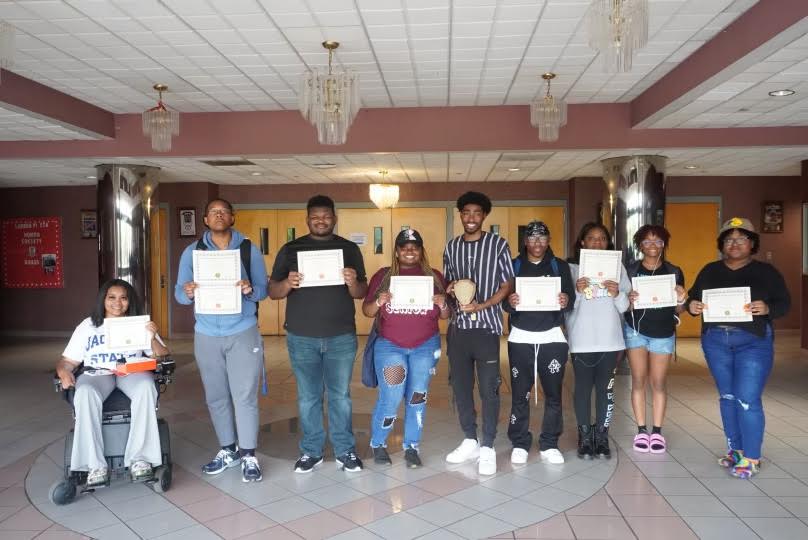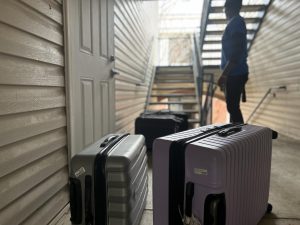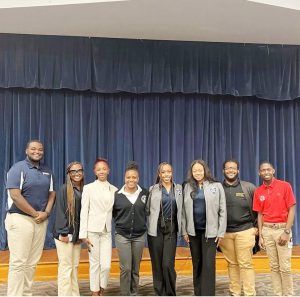Last updated on April 13, 2023
Special to the Flash
On March 30, The Blue & White Flash student newspaper won a total of 10 awards in the Better Newspaper Contest (BNC) during the 25th Annual O.C. McDavid Journalism Summit.
The summit was held at the Mississippi Ag & Forestry Museum in Jackson, Miss. and was sponsored by the Mississippi Press Association Education Foundation (MPAEF).
After the welcome, students were treated to an art presentation by artist Candy Cain.
MPA General Counsel Donna Jacobs then presented a session entitled: Libel Law and Dealing with Defamation.
Jacobs gave the students in attendance several examples of defamation and libel and offered advise on how to avoid lawsuits.
Next, attendees were treated to a panel discussion from newspaper editors and publishers on the impact of community journalism and its future.
The panelists included: Lyndy Berryhill from The Stone County Enterprise, Jackie Hampton from The Mississippi Link, Peter Imes from The Commercial Dispatch and Stephanie Patton from The Leland Progress.
Hampton weighed in on the Mississippi Link’s designation as one of the few African-American owned outlets in Mississippi.
“Our niche market would be our African-Americans readers. The Black Press, which is the same as the National Newspaper Publishers Association…that organization was started in 1827. This year we are celebrating 196 years. It was established because we needed to tell our own stories as African-Americans. Way back in the day in the 1800s, if you read anything about what was going on in the black community, it was who murdered who. There was never anything published about the successes, or the education or the careers,” said Hampton.
Patton, who began her career at Southern Living magazine, moved to Leland to be closer to family. A piece she did about the son of a friend who was receiving his Eagle Scout badge that was submitted to the newspaper led to an offer to buy the newspaper. She first declined but eventually took over the operation and immediately began to make changes.
“I had a lot of work to do on building relationships in the community with the newspaper. Leland is about 70 percent African-American, but you did not know that by reading the paper. I had a lot of work to do to get those stories about everyone in the community, not just a certain segment in the community,” said Patton. “I rely heavily on connections in the community that I have built over the last decade to send me content and pictures and to let me know what’s going on.”
Imes, who had the largest newspaper and newsroom on the panel, gave the students advice on resumes and portfolios when looking for jobs.
“One thing is how important it is to curate the clips that you send along with your resume when you are applying for a job. (Having) A lot of clips doesn’t necessarily mean good clips. I think you want to send three maybe four clips that show your diverse writing styles and those are the ones that really stand out to us,” said Imes.
He also stated that references, cover letters and appropriate dress stand out to employers.
Berryhill told the attendees why she preferred working with a smaller newspaper.
“…I had an internship in Washington, D.C. and that’s what I thought I wanted to do. I wanted to work at a big publication, big city, like big news. I got there and I hated it. A lot of the times when you are covering a big area, you’re competing with a lot of other journalists who’ve done it for a lot longer time and it’s almost like resource scarcity because there are so many people trying to cover the same story and the impact you have is so minimal. You might do an important story and you just never see the end results of it. But if I do a story in my local newspaper about a family whose home gets burned down, I’ve got people calling my office the next morning saying ‘How can we help them or I want to do something for them,’” said Berryhill.
She added, “It is so much more rewarding to be at this level, I would never go to a bigger newspaper or national publication.”
Universities and community colleges from around the state of Mississippi attend the conference and participate in the Better Newspaper Contest which includes categories like: Best General News Story, Best Feature Story, Best Cartoon, Best Series or Investigative News Package, Best Website and more.
Cameron Adams, the editor-in-chief of The Blue & White Flash campus newspaper, said that one of the things he learned from the conference was that he had a lot more work to do.
“To manage a successful staff, I need to acquire new ways to communicate effectively with my staff, which will take a lot of practice. I also learned that as an HBCU, we must work twice as hard as PWIs to gain recognition.”
Adams said that he plans to institute more meetings and also stress the importance of meeting deadlines to ensure the staff remains focused on producing a high-quality newspaper every week.
“I gained a lot of insight from the panel about how to get the staff to meet deadlines. They advised me to build a stronger staff, who will then contribute consistent and quality work at all times,” said Adams.
He added, “They also advised me to be stricter by having consequences for missing deadlines.”
The highly anticipated BNC awards presentation was next.
The Blue & White Flash won the following awards:
1st Place – Tatyana Ross for Best Graphic
2nd Place – BWF Staff for Best Editorials
2nd Place – BWF Staff for Best Front Page
2nd Place – Monica McGhee for Best General News Photo
2nd Place – Monica McGhee for Best Feature Photo
3rd Place – Tatyana Ross for Best Cartoon
3rd Place – Tatyana Ross for Best General News Story
3rd Place – Tatyana Ross for Best Sports News Story
3rd Place – BWF for Best Layout and Design
3rd Place – BWF for General Excellence
According to the MPA, since 1999 the O.C. McDavid Memorial Fund, administered by the Mississippi Press Association Education Foundation, has underwritten the cost of the conference to promote journalism education in the state of Mississippi.
The conference is named after the late O.C. McDavid, former managing editor of the Jackson Daily News, who actively pursued a second career as an artist and sculptor after retiring from journalism.
MPAEF always includes sessions dealing with art during the conference. All attendees receive a copy of the autobiography, “My Name is O.C.”





Be First to Comment